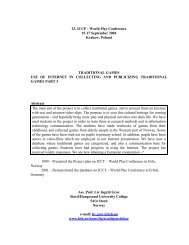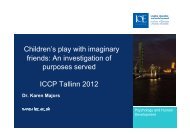Edutainment or Entertainment - International Council for Children's ...
Edutainment or Entertainment - International Council for Children's ...
Edutainment or Entertainment - International Council for Children's ...
You also want an ePaper? Increase the reach of your titles
YUMPU automatically turns print PDFs into web optimized ePapers that Google loves.
At the same time as the museum undergo the changes, there are also other institutions that are<br />
no longer focused on children as the only target group but they widen the offer also f<strong>or</strong> the<br />
adults and are ready to prepare f<strong>or</strong> the demanded target group (families socially handicapped<br />
groups of children, etc.). Entertaining and educative programmes in zoos use f<strong>or</strong> example the<br />
direct contact with animals in the runs and wherever this is possible; children can feed the<br />
goats <strong>or</strong> ride the ponies. Ecological centres <strong>or</strong>ganize a lot of courses based on the<br />
constructivist principles. Children themselves make their bread to get acquainted with the<br />
process starting from the mill to the baking were able to imagine all the accompanying<br />
activities.<br />
Inf<strong>or</strong>mation and communication technologies (ICT)<br />
ICT belong to the most spread phenomena in the field of edutainment. The development of<br />
new technologies and their vast (and theref<strong>or</strong>e cheap) production brought a new phenomena;<br />
entertainment at your home PC <strong>or</strong> any other equipment (play station, video games. etc.). And<br />
in the whole section of the industry there is a new branch that concentrates directly into the<br />
usage of computer games at the education – so called Game Based Learning – GBP. Recently,<br />
we had been experiencing mostly the development of multimedia products (encyclopaedias,<br />
dictionaries, games) distributed using the CD ROM and DVD media (e.g. off line versions).<br />
But now we have been confronted (in the context of the high capacity netw<strong>or</strong>ks) with<br />
development of similar internet based applications. That resulted in the creation of well<br />
collab<strong>or</strong>ated and complex games. Players share the virtual space of the Internet and they can<br />
compete and still cooperate when gaining the territ<strong>or</strong>ies <strong>or</strong> fighting the same enemy and all<br />
that could be done without leaving the room. Multimedia play and also encyclopaedias and all<br />
other didactic means use all the latest technical and also psychological aspects in the<br />
communication with the user. The example to illustrate the latest development follows:<br />
Interaction: virtual system is controlled by the user and acc<strong>or</strong>ding to the programmed <strong>or</strong><br />
individually decided alg<strong>or</strong>ithm the user gets the answer – feedback. Player gets the<br />
inf<strong>or</strong>mation all the time “about his <strong>or</strong> her behaviour” in the system and he <strong>or</strong> she can change<br />
the strategy of decision making.<br />
Multimedia: all the content is delivered via m<strong>or</strong>e f<strong>or</strong>ms, if possible (texts, spoken w<strong>or</strong>ds,<br />
music, pictures, film) and during the process as many cognitive processes of the person as<br />
possible is involved.<br />
Individual and social: all the systems are sub<strong>or</strong>dinated to the individual rate of the user, they<br />
react as he <strong>or</strong> she likes. On one side they isolate the user in the interactively limited space<br />
(user, system, me and PC and so on), on the other hand they enable to create new social<br />
relationships that are not based on the interaction of face to face type, but on sharing the<br />
common virtual space via a communication media (Internet, mobile phones and so on.) using<br />
the new communication application (chat, e-mail, e-discussions and conferences etc.).<br />
Simulation and approaching the reality: Programmes based on the simulation, simulating the<br />
real situation <strong>or</strong> a certain process are very popular mainly thanks to various simulat<strong>or</strong>s<br />
(aircraft control, driving cars etc.). But there are also some m<strong>or</strong>e complex game systems such<br />
as weather f<strong>or</strong>ecasting, prediction of a social behaviour of a group of people (f<strong>or</strong> example<br />
games with a social topics, games simulating stock exchange, city management – quite well<br />
spread game SimCity etc.). Participants in fact change the initial variable values (variables)<br />
that are processed acc<strong>or</strong>ding to a settled alg<strong>or</strong>ithm (complex lists are provided by the<br />
software) and acc<strong>or</strong>ding to the output values it is decided about further steps.<br />
Mass media<br />
Even bef<strong>or</strong>e the rapid development of film and TV there were some features of edutainment<br />
discovered in fairy tales and fables and st<strong>or</strong>ytelling that mirr<strong>or</strong> the experience of the mankind<br />
and are distributed by the w<strong>or</strong>d of mouth. They are especially fables and fairy tales that
















